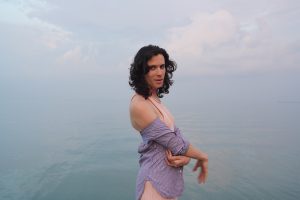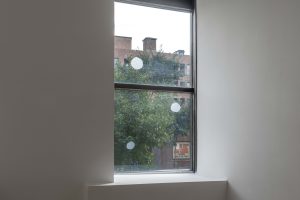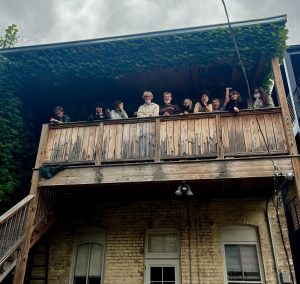Eileen Myles recently gave a talk entitled “MYSELF (pornography)” at Gallery 400. Having experienced it, “performance” is actually a more apt word to describe what unfolded. This performance seemed to punctuate the shows that had just wrapped up at Gallery 400—Kerstin Honeit’s “Ambiguity is my Weapon” and “Bless this Mess” with Edie Fake, Forced into Femininity, Robin Hustle & Lee Relvas. Except that the performance never quite ended—it seemed to play out as fragmented stories and musings meant to linger in one’s mind. Myles is a prominent poet, feminist, performer, and famously ran for president in 1992 as a write-in candidate.
Myles intermingled her talk with excerpts taken from her third novel, Inferno: A Poet’s Novel, which deals in part with the issue of confronting the self in writing or art. What follows is the result of this blurring of lines. She apparently likes the word “dirty” and kept the audience engaged for the hour that she spoke, reading and sometimes deviating from papers that she shed to the ground like layers, perhaps revealing whatever “Eileen Myles” she had decided to bring on that particular evening.

I’m all the time adjusting my thoughts and my body to the world. ‘Who am I, what am I?’ Often when I’m invited to give talks or read or perform, I have to think, ‘Who was invited? Which me should I be?’ You probably know this—when somebody asks you to be yourself, you’re like, baaah, which one?? Myles the poet, Myles the fiction writer, art critic, librettist? I’m the through line—my self is a big part of my art. But basically, I’m a poet.” [she proceeds to reads a poem called “Shhh”]
There’s a nice moment that happens in an artist’s career; for me it was in my 40’s, when I realized that, in relationship to what I meant to do, um, I hadn’t been stopped. I don’t mean piece by piece, I mean the whole thing…to use yourself in your work, in the writing world for sure, is considered a little gauche, dirty. Maybe I’m stepping away from sexual dirty for a minute—well maybe for like 20 minutes. But to use your name is slightly vile, a little out of control, lower class. The person clearly doesn’t have enough. She would probably stoop to any level using what anyone has, a name, and she’s most likely female, or poor, queer or has been violated and now is perfectly happy to get out of control with her violation and hand it to you, trying to make it your problem.
In grade school or high school, they simply told you to not use “I” in your writing, to avoid self or God, I suppose. Or being low. But the thing about “I” is that it works so good. It’s like driving and saying, ‘Oh, but don’t use the steering wheel.’ Really? Do you think I have a chauffeur? My work is hands on. [she fumbles, unsuccessfully trying to turn the page; the audience laughs]
This is a hard talk to give, hard topic, since I’m continually having a fresh thought in every direction. It’s like standing in a forest talking about trees. ‘There’s another one!’
Poetry, by the way, is about failure— digging your heels in and doing failure. I decided it was more radical to kick all the artifices to the ground and stand there in my own name and allow the work to be both visible and continuous with the world. The easiest medium to perform this end is poetry. The simplest medium. A poem has a lot of space around it on the page, which suggests that you are always free to doodle. The rooms that poetry is read in are often calm, pretty boring—good for writing. I mean, if you go to a poetry reading, you know half the people in the room are writing, they’re not listening to the reading—they’re writing poems. Because there’s actually no studio for poems, so people just use readings.

By the time I was in college, I was going through a lot of struggling about drugs and sexuality and where I was going in my life, on and on. I couldn’t stop thinking—and I had a very hard time concentrating on anything and, uh—it actually says ‘uh.’ It’s a Warholian gesture. In English class—do you know that actually when Interview magazine, which nobody reads anymore, when it first came out, one of its biggest innovations—you must know this—is that it had every ‘uh’ and ‘um’ printed. When people made those sounds—that was Andy Warhol’s genius, he said, ‘Now put those things in.’ So, you know, there were these long and crazy interviews. Um. In English class, I could always read poems, whatever my state, so my last years in college, instead of doodling like in high school, I wrote poems. And I thought, hm, this feels good. I definitely thought that after college I would be in some other reality where I would actually be doing real things and would feel connected to the world, and I wouldn’t be wasting my time like this.
Which just wasn’t true. After college, my life was even more fake. At home, at work, I couldn’t believe this was true. Jobs and so on. This is what we got. So I wrote even more. One of the great things in my life I’ve discovered—I’m trying to share my tools with you; I’m trying to give an inspirational talk, I hope [laughs]— is that, if you can do this thing in any state, that is the thing you should be doing in your life. Don’t be a snob about your gifts. If this is all you can do, that’s plenty. Even this little thing.
So, the poem that I read in the beginning, um, with the flower and the bus. Ok, I’m gonna put the poem back in the world that it came from. This is like an installation. Which is actually what I did—I wrote a novel about being a poet and I basically plug my poems back into the world. My hope is to be making the work dirty again with the world. But since this is an art school, and also since this is merely a recording—this talk, my book, everything I’m doing here—um, think of me as popping on a video, an excerpt from my film, that’s what I m doing. Ok, so imagine the film. It gets dark, the room gets darker. It’s called Modern Art, 1990. 10 years later when I had gotten sober—this is video, right, remember, I’m not reading anymore—this is a visual experience. I actually got a grant from the NEA to do another play called Modern Art. Weirdly, I’ve always gotten more support for theater projects than for poetry. Like theater is where homosexuals belong. Modern Art had 3 parts. My idea was to have the play open with two guys describing some art you couldn’t see. The audience would watch the men’s faces light up and shift while the paintings got described in the glow of their conversation. While they listened, the audience was making the paintings too. It was kind of on them—this is Part One.

1990 was a totally political time; George Bush was president, people were dying of AIDS, a lot of our friends, and there was no money being spent by the government either on AIDS or art. So a lot of extreme sexual and political work was made at that time. It was just in response to the situation. But that kind of edgy political work wasn’t exactly what I was doing. I felt a little like my mother—I just wasn’t surprised that the government wouldn’t support this work. What would you expect? I had personally grown up in a world of total censorship, so I wasn’t surprised to see politicians wanting to take money away from the art that was explicitly talking about this entire reality of ours. It seemed like the real desire for them—the politicians—was to have no description. That’s what they would have paid for.
And artists were getting defunded, fired essentially, for speaking the truth. It was horrible, it was shocking, but I was always getting fired, so it just seemed normal to me. Part Two of Modern Art was a course of women in Roman legionary costumes. I thought theater should always have a dance scene like on TV. The legionaries were funded in the play, but also in reality by the NEA, to recite bad, feminist poetry, which I had written. In unison, while doing some kind of water ballet—it was silly, it was kind of hard to find someone to choreograph. I kind of wanted Groucho Marx and the avant garde, but I never really found it.
Nuns were crazy about legionaries when I was a kid. They were on everything. It was like they were storm troopers—a threat. When kids were bad in Catholic School, the nuns would have the kids stand alone in the darkness of the press, which were sliding doors in the back of the room, behind where we kept our lunch boxes, coats, and boots. I was never a kid in there, but in sixth grade, a nun had me draw some legionaries to decorate these doors—I was that kid. I was not bad, but I was also not quite here. I was like a boy in a skirt always drawing.
What I’m trying to say is that this kind of work that uses its own name is a little messy, it’s uncomfortable, but it’s good. It’s the friction of living. It’s heat, it’s dirty. It’s a little untrustworthy. And all of it, by the way, is just a recording. I think that’s the point I’m trying to make. Or one of the points I’m trying to make. I personally don’t care about literature at all, do you? Um, there’s a dirty conversation going on, I read it in blogs all the time, I think is so narcissistic, um, I mean I’m talking about literary blogs which I don’t know if you guys read, but for instance instead of writing about my book, they’re talking about themselves. They pick up the book and they say, ‘Why is this fiction? Why isn’t this memoir? Isn’t it autobiography?’ And I just want to say that that’s kind of a non-authoritarian way of jerking off. Um, do you know what I mean?

Authoritarian would be to pick up a book or a poem or look at a painting and say, ‘That’s not art. That’s not poetry.’ Authoritarian rejects the whole category; says this is not this, um, and that’s what the powers that be are essentially saying when you don’t get a grant. There’s like a waste basket and a pile of winners, and so [pointing to audience members] ‘You’re an idiot, you’re not an artist, you’re a genius. And here’s your award.’ That’s how it works. Thank you for telling us what art in our time is. But if you spend all the time saying, ‘Is this a novel, is this fiction, is this a poem? I don’t know what this is,’ you’re basically saying, ‘Stay in your genre, your gender.’ Is that a man or a woman? Is this a novel or a poem, is that a poem? I think it’s a memoir…all of it reminds me of when Andy Warhol’s The Chelsea Girls came out. I was in high school but I like to think about it. It was kind of a hit. It cost 15,000 dollars to make and it made 150,000 dollars. It was six hours long, or three if you used two cameras running at the same time, which is what Warhol did, and Newsweek called it ‘The Illiad of the underground.’
But this is my point—Rex Reed, who is, interestingly, a not-so-closeted homosexual critic—he wrote, ‘Chelsea Girls is a three-and-a-half hour long cess pool of vulgarity and talentless confusion, which is about as interesting as the inside of a toilet bowl.’ In fact, I think that’s kind of fascinating because it’s sort of authoritarian and anti-authoritarian, um, and actually The Chelsea Girls was banned in Boston which made Andy Warhol extremely happy. He thought, ‘I’ve arrived’— is what he said.
I mention poetry here in all the things I’ve been saying because that’s what I do, that’s how I began writing, and I mention it in the context of pornography because the poet is always going, ‘Oh,’ which means, she’s coming, again and again. Poetry is ejaculating and vanishing. It’s a keyhole on the world— the poet is peeping, which makes the people laugh, and then they look too. I’m comparing myself to Samuel Stewart, not because I write so much about sex but that I do it at all, and I use my own name. Pornography [the word itself] means ‘writing about prostitutes,’ literally. Me? You? A culture is a contagion of spaces; in writing we describe them, we fortify them and we join them as we are passing. When we fictionalize our lives and our names, we generalize too, and we help to make the public space safe, which is patently untrue. Or maybe I think about that word ‘safe’ and I just want to ask, ‘For who?’ Thanks.
These excerpts have been edited for clarity and length. For more information about Eileen Myles and her projects, visit her website.
For more about Myles’ books, please visit orbooks.com



